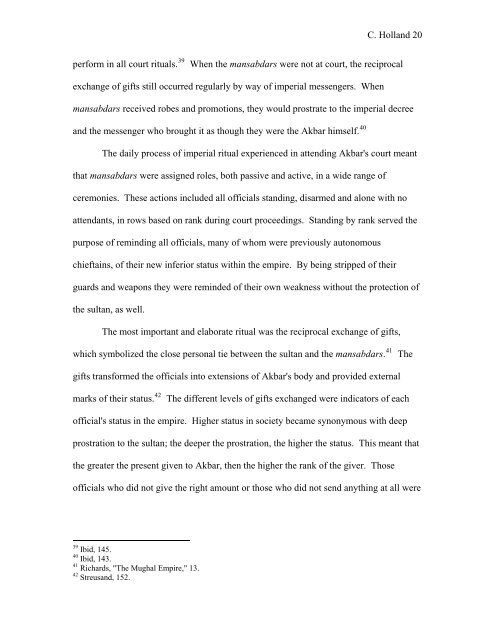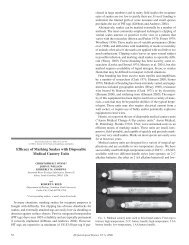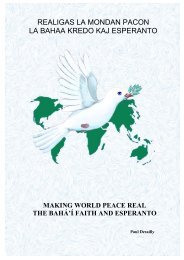Akbar and the Mughal State - University of Georgia
Akbar and the Mughal State - University of Georgia
Akbar and the Mughal State - University of Georgia
Create successful ePaper yourself
Turn your PDF publications into a flip-book with our unique Google optimized e-Paper software.
C. Holl<strong>and</strong> 20<br />
perform in all court rituals. 39 When <strong>the</strong> mansabdars were not at court, <strong>the</strong> reciprocal<br />
exchange <strong>of</strong> gifts still occurred regularly by way <strong>of</strong> imperial messengers. When<br />
mansabdars received robes <strong>and</strong> promotions, <strong>the</strong>y would prostrate to <strong>the</strong> imperial decree<br />
<strong>and</strong> <strong>the</strong> messenger who brought it as though <strong>the</strong>y were <strong>the</strong> <strong>Akbar</strong> himself. 40<br />
The daily process <strong>of</strong> imperial ritual experienced in attending <strong>Akbar</strong>'s court meant<br />
that mansabdars were assigned roles, both passive <strong>and</strong> active, in a wide range <strong>of</strong><br />
ceremonies. These actions included all <strong>of</strong>ficials st<strong>and</strong>ing, disarmed <strong>and</strong> alone with no<br />
attendants, in rows based on rank during court proceedings. St<strong>and</strong>ing by rank served <strong>the</strong><br />
purpose <strong>of</strong> reminding all <strong>of</strong>ficials, many <strong>of</strong> whom were previously autonomous<br />
chieftains, <strong>of</strong> <strong>the</strong>ir new inferior status within <strong>the</strong> empire. By being stripped <strong>of</strong> <strong>the</strong>ir<br />
guards <strong>and</strong> weapons <strong>the</strong>y were reminded <strong>of</strong> <strong>the</strong>ir own weakness without <strong>the</strong> protection <strong>of</strong><br />
<strong>the</strong> sultan, as well.<br />
The most important <strong>and</strong> elaborate ritual was <strong>the</strong> reciprocal exchange <strong>of</strong> gifts,<br />
which symbolized <strong>the</strong> close personal tie between <strong>the</strong> sultan <strong>and</strong> <strong>the</strong> mansabdars. 41 The<br />
gifts transformed <strong>the</strong> <strong>of</strong>ficials into extensions <strong>of</strong> <strong>Akbar</strong>'s body <strong>and</strong> provided external<br />
marks <strong>of</strong> <strong>the</strong>ir status. 42 The different levels <strong>of</strong> gifts exchanged were indicators <strong>of</strong> each<br />
<strong>of</strong>ficial's status in <strong>the</strong> empire. Higher status in society became synonymous with deep<br />
prostration to <strong>the</strong> sultan; <strong>the</strong> deeper <strong>the</strong> prostration, <strong>the</strong> higher <strong>the</strong> status. This meant that<br />
<strong>the</strong> greater <strong>the</strong> present given to <strong>Akbar</strong>, <strong>the</strong>n <strong>the</strong> higher <strong>the</strong> rank <strong>of</strong> <strong>the</strong> giver. Those<br />
<strong>of</strong>ficials who did not give <strong>the</strong> right amount or those who did not send anything at all were<br />
39 Ibid, 145.<br />
40 Ibid, 143.<br />
41 Richards, "The <strong>Mughal</strong> Empire," 13.<br />
42 Streus<strong>and</strong>, 152.





